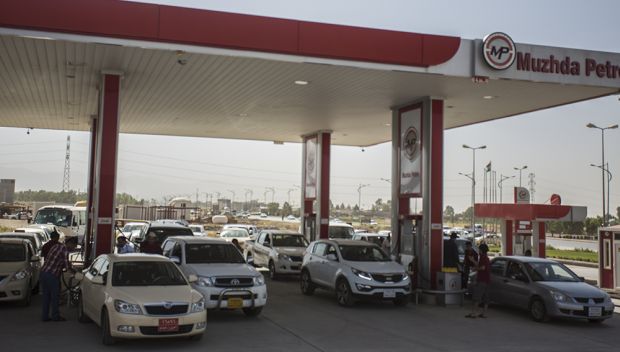
Residents line up to purchase gas at a station in Kirkuk on June 21, 2014. (Asharq Al-Awsat/Hannah Lucinda Smith)
Kirkuk, Asharq Al-Awsat—Iraq’s oil infrastructure was subjected to repeated sabotage and theft in the months before the fall of Mosul, an industry insider has told Asharq Al-Awsat.
“There was a sabotage on the pipeline from Baiji two weeks before the attack on Mosul,” said the source, who spoke to Asharq Al-Awsat on the condition of anonymity.
“The line was tapped at Al-Hadr [around 25 miles south of Mosul] and the stolen oil was loaded into tankers and smuggled out. There were three different types of insurgents in that area—ISIS, Ba’athists and criminals.”
The Islamic State of Iraq and Syria (ISIS) and its predecessor, Al-Qaeda in Iraq, have long targeted the country’s oil infrastructure in order to raise funds and create instability. The group now controls all the oil fields in eastern Syria’s Deir Ezzor province.
“ISIS have a lot of experts, including oil experts,” said the source. “The problem now is that most pumping stations in Iraq are under ISIS control.”
The collapse of the Iraqi Army has placed extra pressure on Iraq’s oil security. The army’s 12th Division was previously responsible for maintaining the security of some of the region’s pipelines.
The Baiji Oil Refinery, which supplies 60 percent of Iraq’s fuel, has been out of action since the city of Mosul slipped out of government control on June 10. ISIS insurgents and the Iraqi National Army have been locked in fierce clashes for control of the refinery, which lies near Saddam Hussein’s hometown of Tikrit. The town was captured by insurgents on June 11.
The line between Baiji and Kirkuk was set on fire on June 13, as the fighting around Baiji began.
As a fuel shortage grips the country, drivers in the Kurdish-controlled region of northern Iraq have been lining up overnight at gas stations to fill up their cars. Opening hours have been limited to 7 am to midday at government-controlled stations, and drivers are only allowed to purchase 8 gallons (30 liters) every other day.
At stations in Kirkuk, the city worst hit by the crisis, the line stretches to a couple of miles by late afternoon. One taxi driver in the city told Asharq Al-Awsat that he had been forced to wait in line for five hours to fill up his tank.
“The queues started right from the day that Mosul fell,” said Fazel Raza, the manager of a petrol station in the Rahimawa district of the city. “The government is always telling us that they have backup stocks, but people are not comfortable when they have empty tanks.”
Gas stations have been taking their supplies from government-controlled stores since the start of the crisis, but it is unclear how long those stocks will last.
“We think that they may be mixing the fuel to make it last longer,” said Raza. “The quality is not as good as it was before. We have been testing it on our own vehicles, and three of them have broken down.”

Iraqi fake govt should resing .because corent govt killed so many sunnis nuri malaki dos’t have rights to rule in iraq. He and his loyals should be quit